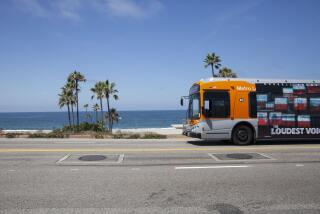Melvin Webber, 86; transit expert helped plan BART system
- Share via
Melvin M. Webber, a city planner and mass transit specialist who worked on the early phases of the Bay Area Rapid Transit system but later became a critic of BART because it failed to meet early expectations, has died. He was 86.
Webber, a longtime faculty member at UC Berkeley, died November 25 at his home in Berkeley. The cause was cancer, said Kathleen Maclay of the university’s media relations office.
BART was considered a pioneering venture when Webber got involved with it in the 1950s, working on such regional planning issues as routes and train station locations. The high-speed electric rail system connects San Francisco with Oakland and outlying areas. It promised to help reduce traffic congestion and cut air pollution.
But commuters complained that BART stations were too far apart, yet the distance was a requirement for a train traveling at 80 mph.
“The paradox is that potential passengers are not using it because it is too rapid,” Webber told Newsweek magazine in 1978.
After its inaugural trip in 1972, Webber conducted a two-year study and found that BART attracted only about half the expected number of riders and that fare revenues covered only about one-third of the transit system’s operating expenses.
“BART was a mistake,” Webber said in a 1987 interview with the Los Angeles Times. “Given exclusive right of ways at certain times, buses would have offered better pickup and delivery,” he said.
Over the years, Webber’s views evolved.
“Mel came to realize that transportation isn’t just about moving people around,” said Elizabeth Deakin, a professor of planning at UC Berkeley and a longtime colleague of Webber. He learned from experience that cultural, political, economic and other factors have to be considered, she said.
“Mel also said that we might some day be glad we have BART,” Deakin said. “And that has happened.” The system has been improved, starting with an upgrade in 1987 when 150 new cars were added and the train control system was improved.
As an outgrowth of Webber’s work in public transit, he became interested in the ways that technology redefines societies.
“Mel argued that a community is about shared interests, meaning you can be part of a worldwide community,” Deakin said. He predicted “globalization” in the 1970s, years before the term was part of everyday conversation, she said.
Webber was born in Hartford, Conn., on May 6, 1920.
He earned a bachelor’s degree and a master’s in both economics and sociology at the University of Texas in Austin. He then earned a master’s in economics and planning at UC Berkeley, where he joined the faculty in 1959.
For some years he was director of UC Berkeley’s Institute of Urban and Regional Development and director of the UC Transportation Center.
When he retired in 1990 he was named professor emeritus.
Webber is survived by his wife, Carolyn, and his daughters, Jane Webber and Martha Muraro, all of Berkeley; his son, Thomas, of Pacifica, Calif.; and four grandchildren.
*
More to Read
Sign up for Essential California
The most important California stories and recommendations in your inbox every morning.
You may occasionally receive promotional content from the Los Angeles Times.













